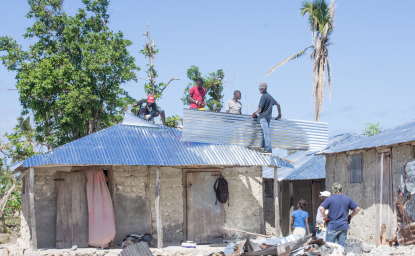Avoiding <i>Collapse</i>: Lessons for a Sustainable World
Former Ambassador Kenneth C. Brill reviews Jared Diamond's new best-seller
Former Ambassador Kenneth C. Brill reviews Jared Diamond's new best-seller
Collapse: How Societies Choose to Fail or Succeed
Jared Diamond
New York: Viking Penguin, 2005. 592 pages.
Reviewed by Kenneth C. Brill
"This is the way the world ends / Not with a bang but a whimper."
T.S. Eliot, "The Hollow Men"
Collapse: How Societies Choose to Fail or Succeed, Jared Diamond's hefty and challenging new book, demonstrates that while popular history is replete with stories of conquered empires that ended with a bang, a number of civilizations collapsed under the weight of their own actions (or inactions) regarding their environment, and thus ended, perhaps literally, with T. S. Eliot's whimper. Diamond argues that the failures of the past provide lessons for today's societies; global prosperity and wellbeing require that we act on these lessons, so that the past does not become prologue.
Collapse has been widely reviewed in the press—even more widely discussed in the blogosphere—and Diamond has given a number of well-publicized speeches and interviews on its themes (including one published in last year's issue of this report). So instead of offering a general review of the book, I will focus on some of the implications of Diamond's theses for today's policymakers and the informed public.
But first, a few comments on the book itself. Reading Diamond is always a pleasure, even when he is not writing about pleasant events. He writes well and entertainingly, and the amount of knowledge he can deploy to support his arguments is impressive, interesting, and often convincing. For example, instead of relying solely on academic studies for his chapters on the demise of the Easter Islanders and the Norse of Greenland, he visited the sites himself, which helps bring to life these long-past civilizations and the problems that caused them to fail.
While I enjoyed the book and admire what Diamond has accomplished, on balance he has probably done too much. At more than 500 pages, Collapse is a long read, even for the most committed. In chapter after chapter, Diamond makes his case and then piles on additional material that reconfirms an argument already well made. Less information might have been more convincing—in part because more people would have time to read the whole book.
Most valuable is Diamond's ability to make the past accessible and understandable, and then demonstrate its relevance to the present and future. Many of Collapse's critics argue that Diamond focuses on past civilizations that were uniquely vulnerable because they were island-based, or otherwise remote and resource-constrained. Therefore, according to these critics, these past experiences are irrelevant to today's world, which has the technology, science, and capital to deal with its problems. Some accuse Diamond of espousing "environmental determinism," a charge he rejects (page 302).
But these critics discount Diamond's opening chapter on the challenges facing today's Montana, which he uses to frame the book. Diamond lets Montana's situation illustrate that vulnerability is not unique to islands or drought-prone regions; even a seemingly prosperous state in the most affluent and technologically advanced nation in human history suffers from some of the same problems that undermined earlier civilizations. His review of four contemporary cases (Rwanda, the island of Hispaniola, China, and Australia) vividly demonstrates that the seeds of past "collapses" are very much present in today's world—and not only in the developing countries.
In the final chapter, Diamond declares that societies, in essence, choose to fail or succeed, and concludes that there is reason to be "cautiously optimistic." This optimism rests on his expectation that the seeds of collapse will not go completely unattended and that we will take sustainable steps to deal with them.
Lessons From Collapse
In the post-9/11 world, some in political and policy circles argue that security and terrorism must be our overriding concerns, making all other issues secondary. Diamond suggests that globalization and the interconnectedness of global systems require policymakers to take a broader view. To that end, I recommend that policymakers consider the following lessons drawn from Collapse:
• Human impacts on the environment and other global systems have real-world consequences in the near term, such as for the war on terrorism. Failed states breed instability and insecurity well beyond their borders. Deforestation, one of the issues highlighted in Collapse, can affect state health and regional stability by undermining local livelihoods and creating conditions for long-term economic decline. For example, Charles Taylor's rape of Liberia's forests sustained several destabilizing insurgencies in West Africa and created conditions for continued instability in Liberia—and beyond.
Had a forest certification scheme been in place, it would have been more difficult for Asian and European timber buyers to fund Taylor at the outset. Therefore, international and regional agreements on such issues as forests, fisheries, and water pollution are not just "nice" things to do for the environment, they are required for development, prosperity, stability and, ultimately, security.
• Environmental problems need to regain the attention and priority they enjoyed in development aid programs of the 1990s. Collapse makes a strong case that environmental and human impact issues played a role in Rwanda's genocide, and Diamond is not the first to identify the political, security, and human consequences of Haiti's devastated environment.
Other countries, such as Afghanistan, Uganda, and Namibia, support the argument that the environment must be a key component of any sustainable development program. In addition, the growing body of evidence on the impacts of climate change, the pressure on fresh water supplies, and the steady destruction of forests by legal and illegal logging, to name only a few, show that aid programs must make the environment a priority if we are to meet development goals—and promote regional stability and global security in the process (see Millenium Ecosystem Assessment, 2005).
• In Chapter 14, Diamond notes that societies can make bad decisions and fail for a variety of reasons, such as not anticipating or perceiving problems. Clearly, in a globalized world, policymakers need long-term analyses of environmental and human impact "mega trends" to help them both anticipate and identify problems.
It is, therefore, distressing that while the National Intelligence Council (2000) report Global Trends 2015 addressed some issues related to human impacts on the environment, the recently released Mapping the Global Future: Project 2020 (NIC, 2004) essentially does not. The NIC and other security bodies should regularly examine the impact of environmental problems on development and stability in key countries and regions.
• Having information is only part of the battle. Collapse also argues in Chapter 14 that societies can fail if they do not respond rationally as a problem develops. The depletion of fisheries and the spread of persistent organic pollutants, for example, are known problems addressed by international and regional agreements. Climate change, on the other hand, is a known problem to which states have only partially responded. Not only has policy failed, but the public has also failed to insist that such known problems are addressed, not avoided.
• The spread of democracy and the rule of law are essential to sustainably confront the human impact issues Diamond discusses (despite the unique example presented by the former Dominican dictator and environmentalist Joaquin Balaguer). Corruption is antithetical—and good governance is vital—to sustainable resource management and the regulation of human impacts on global environmental systems. But, as we have seen repeatedly, corruption is sure to occur when economic interests seek to exploit limited resources in the absence of transparency and strong legal systems. Democracies tend to be both transparent and supportive of the rule of law. The United States has led the way in promoting the rule of law as an essential part of sustainable development, despite some developing countries' insistence that such issues are "political" and have no place in development discussions.
However, developing countries' support for a global anti-corruption convention in 2003 indicates that the link between the rule of law and sustainable development is becoming more widely accepted. But more needs to be done, and in this regard, the Bush administration's broad efforts to promote international democratic reform could benefit the environment and help, in Diamond's words, societies choose to succeed.
Finally, the most fundamental step is one we all can take: individuals concerned about human impacts on the global environmental systems that sustain us must work steadily to increase the number of people who share those concerns. We must make the environment an important issue across the political and ideological spectra, by building inclusive coalitions, and, as Diamond points out in Chapter 15, working with—not against—businesses and other economic interests. For example, the Marine Stewardship Council, an NGO-industry collaboration that promotes sustainable fisheries and sustainable fishing practices, is constructively contributing to both the economy and the environment. Broad-based support is essential, if politicians and policymakers are to overcome the daily pressure to provide only short-term responses to any problem—and if we are to avoid perpetuating "the tragedy of the commons."
Collapse is a big book, and not just in its size. It raises important issues, suggests some ways forward, and should increase our understanding of why we must sustainably address human impacts on the environment and other global systems, at all levels—local, national, and international. In Collapse, Diamond describes how past civilizations have ended with a whimper, not a bang. Let us hope that we can learn from, and act on, these lessons from the past, so that unlike in "The Hollow Men," no shadow will fall "Between the idea / And the reality."
The views expressed are solely those of the author and do not reflect in any way the views of the U.S. Government.
Biography
Kenneth C. Brill is currently the international affairs advisor and a professor at the National Defense University's Industrial College of the Armed Forces at Ft. McNair in Washington, D.C. He has previously served as the U.S. ambassador to Cyprus, the U.S. governor on the Board of Governors of the International Atomic Energy Agency, the U.S. permanent representative to the United Nations Office in Vienna, and the acting assistant secretary of state for oceans, environment, and science.
References
Millennium Ecosystem Assessment. (2005, March). Millennium Ecosystem Assessment synthesis report (pre-publication final draft approved by MA Board on March 23, 2005. Retrieved April 10, 2005, from http://www.millenniumassessment.org/en/index.aspx
National Intelligence Council. (2004, December). Mapping the global future: Project 2020 (Report of the National Intelligence Council's 2020 Project, NIC 2004-13). Retrieved April 10, 2005, from http://www.foia.cia.gov/2020/2020.pdf National Intelligence Council. (2000, December). Global trends 2015 : A dialogue about the future with nongovernment experts (NIC 2000-02). Retrieved April 10, 2005, from http://www.cia.gov/nic/PDF_GIF_global/globaltrend2015.pdf

The Environmental Change and Security Program (ECSP) explores the connections between environmental change, health, and population dynamics and their links to conflict, human insecurity, and foreign policy. Read more



